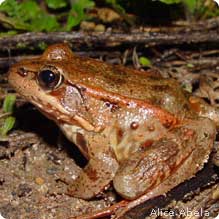- A new CEQA requirement to evaluate impacts on tribal cultural resources
- New fracking reporting requirements for oil operators
- New wetlands guidelines from the Corps
- A mandatory change to notary acknowledgment forms
- A new CDFW CEQA filing fee schedule
In addition to the endangered California Red-Legged Frog being named as the official State of California Amphibian (AB 2364), here are some other items of note as we move into 2015:
Tribal Cultural Resources: Under AB 52, for projects for which either an EIR notice of preparation or a notice of negative declaration is filed on or after July 1, 2015, potential impacts on “tribal cultural resources” must be evaluated. For more information on AB 52 and other 2014 CEQA legislation and CEQA court decisions, please click here to see Mike Zischke’s post entitled “CEQA Update: 2014 Case Law And Legislative Developments.”
 Fracking Reporting: Effective January 1, 2015, oil and gas operators must submit quarterly water reports to the State’s Division of Oil, Gas & Geothermal Resources providing information related to fracking activities, such as the source, volume, quality, and disposition of all injected water, the quality, treatment and disposal method of all produced waters, and the source, quality, and use of all other treated and recycled waters used in their oil and gas field activities. For the Legislative Counsel’s Digest and full text of SB 1281 click here. For DOGGR’s “Notice to Operators” regarding the requirements of SB 1281, click here.
Fracking Reporting: Effective January 1, 2015, oil and gas operators must submit quarterly water reports to the State’s Division of Oil, Gas & Geothermal Resources providing information related to fracking activities, such as the source, volume, quality, and disposition of all injected water, the quality, treatment and disposal method of all produced waters, and the source, quality, and use of all other treated and recycled waters used in their oil and gas field activities. For the Legislative Counsel’s Digest and full text of SB 1281 click here. For DOGGR’s “Notice to Operators” regarding the requirements of SB 1281, click here.
New Wetlands Mitigation Guidelines from the Corps. The U.S. Army Corps of Engineers (Corps) has issued a comprehensive new set of guidelines for mitigation to be required under Section 404 wetland fill permits. Click here to review the post of Clark Morrison and Scott Birkey on the scope and implications of the new guidelines.
Notaries: Effective January 1, 2015, Civil Code Section 1189 requires new wording and formatting for notary acknowledgements. County Recorders will not record documents that are not notarized in compliance with the new provisions of Section 1189. Click here to review the amended Section 1189.
CDFW: Effective January 1, 2015, the California Department of Fish and Wildlife has increased its CEQA Environmental Document Filing Fees. The following information appears on the CDFW website:
CEQA Environmental Document Filing Fees
CDFW imposes and collects a filing fee to defray the costs of managing and protecting California’s vast fish and wildlife resources, including, but not limited to, consulting with other public agencies, reviewing environmental documents, recommending mitigation measures, and developing monitoring programs.
| CEQA Document | Fees Effective January 1, 2014 |
Fees Effective January 1, 2015 |
| Negative Declaration (ND) | $2,181.25 | $2,210.00 |
| Mitigated Negative Declaration (MND) | $2,181.25 | $2,210.00 |
| Environmental Impact Report (EIR) | $3,029.75 | $3,069.75 |
| Environmental Document pursuant to a Certified Regulatory Program (CRP)* | $1,030.25 | $1,043.75 |
| County Clerk Processing Fee** | $50.00 | $50.00 |
* CRPs include certain state agency regulatory programs as defined in section 21080.5 of the Public Resources Code and section 15251 of the CEQA Guidelines. Beginning July 1, 2013, CEQA/CRP Filing Fees will no longer apply to the filing of Notices of Decision or Determination for Forest Practice Rules and Timber Harvest Plans (Pub. Resources Code, § 4629.6, added by Stats. 2012, ch. 289, § 3).
** Additional county fees may apply. Please check with your county clerk’s office for details.
 Lay of the Land
Lay of the Land


